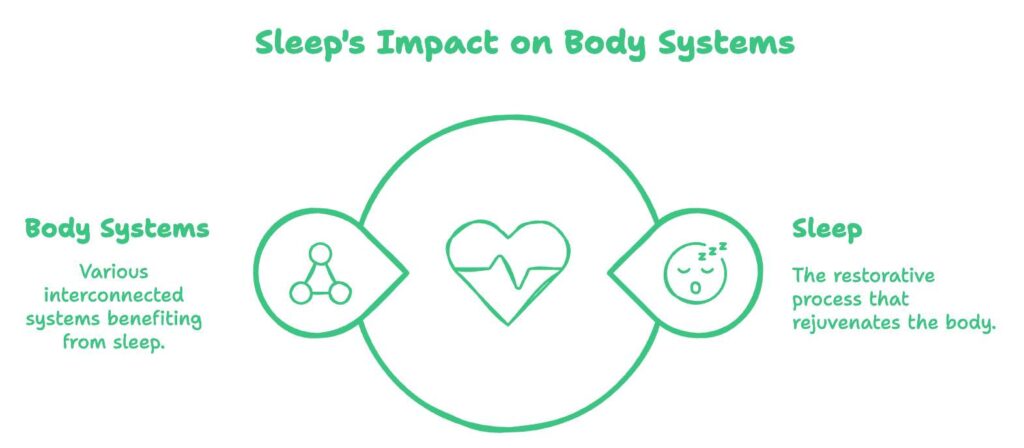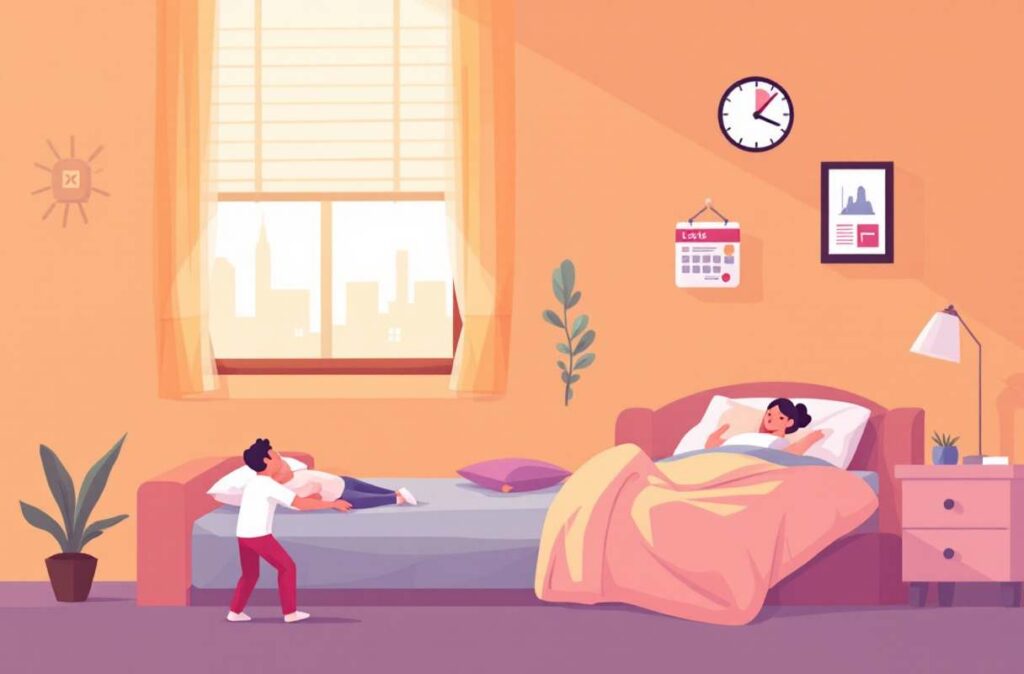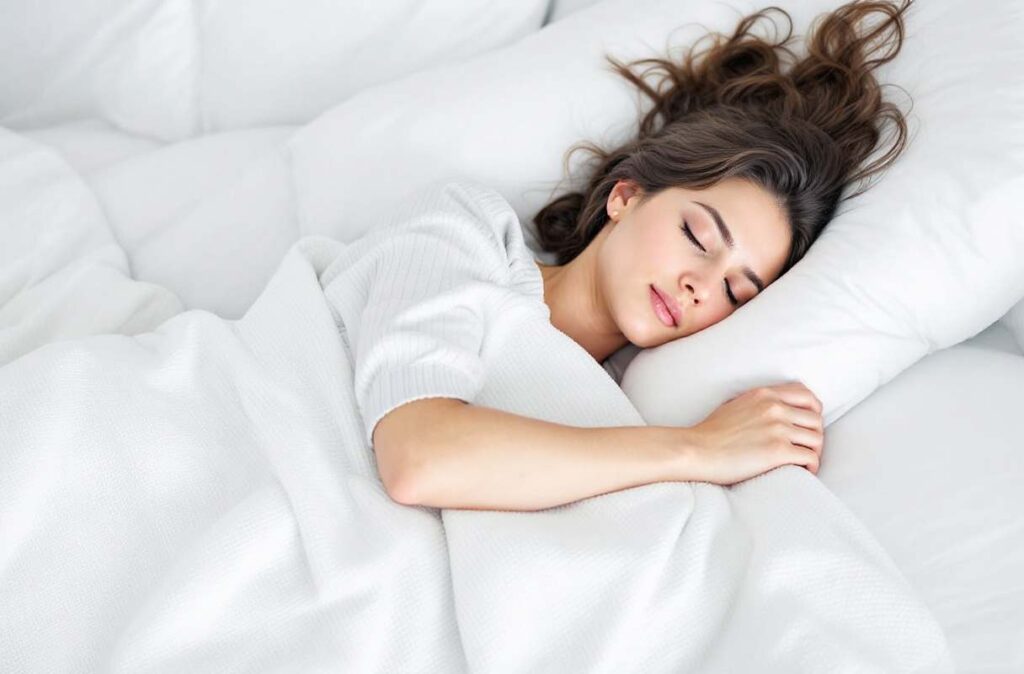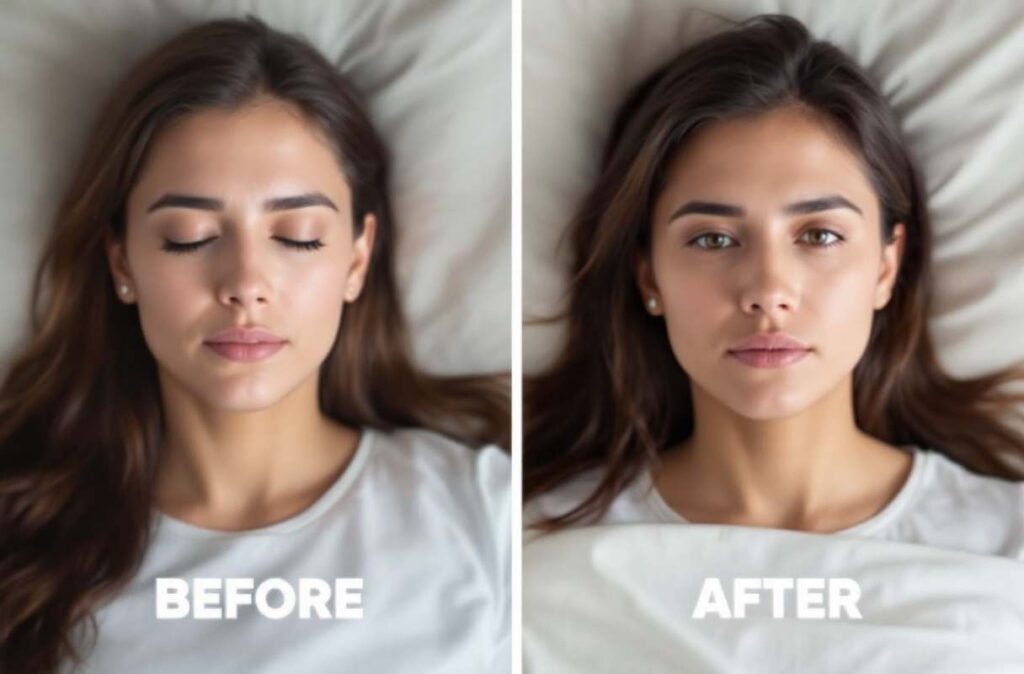Ever wonder why one poor night’s sleep can turn you into a cranky, foggy-brained version of yourself, while quality rest makes you feel like you can conquer the world? Sleep isn’t just a daily timeout – it’s your body’s vital reset button, affecting everything from your mood to your immune system.
Whether you’re a busy professional pushing through on caffeine, a parent juggling family sleep schedules, or someone simply trying to understand why quality rest matters, discovering the true importance of sleep could be the game-changer you need. Let’s explore how those precious hours of shut-eye shape your mental clarity, physical health, and overall well-being.
Understanding the Importance of Quality Sleep
Getting your beauty rest isn’t just for looks. A good night’s sleep is like hitting the reset button for your whole body. It works wonders for how you feel, both physically and mentally. Dodging sleep issues naturally could mean smoother days ahead and a happier, healthier life.
Impact of Poor Sleep on Overall Health
Skipping out on quality sleep can really do a number on you. Below are a few of the nasties that come from not catching enough zzz’s:
| What Happens | What It Does to You |
|---|---|
| Brain Fog | Your noggin’s not as quick, messes with memory, and trips up decisions. |
| Health Headaches | Got to bed late too often, and you’re looking at a higher chance of diabetes, heart troubles, and packing on pounds. |
| Crankiness | Lack of sleep can make you a grouch, or worse, bring anxiety and blues. |
| Low Defenses | Without rest, your body’s army isn’t as strong, making colds and other bugs more common. |
Noticing these hiccups shows why drifting off peacefully is a big deal. If you’ve got little ones, teaching them good sleep habits helps everyone in the house feel better.

Benefits of Improving Sleep Naturally
Think of fitting in some natural sleep magic as a life hack with amazing perks. Check out how sweet dreams can level up your life:
| Perk | What You’ll Feel |
|---|---|
| Lifts Your Spirits | Rest cranks up your happy and keeps your emotions steady. |
| More Get-Up-and-Go | Wake up ready to take on whatever with fresh energy. |
| Gutsy Good Health | Sleeping soundly builds up your defenses and keeps those nasty health problems away. |
| Sharper Mind | Snooze well, and brainpower’s through the roof – ready for work or play. |
Turning to Mother Nature for your sleep solutions can really pay off. Simple tricks like winding down before bed, ditchin’ the screens early, and eating right can make a big difference. Want to dive deeper? Check out our piece on screen time and sleep, or get some solid advice aimed at college students.
Establishing Healthy Sleep Habits for Parents of Young Children
Getting that precious shut-eye is a wishy-washy topic, huh? Especially if you’ve got kiddos raring to go! But fear not, setting up some sound sleep habits can be a lifesaver, making nights smoother for both you and your bundle of energy.
Creating a Bedtime Routine for Children
Kids benefit big time from a set pre-bed ritual. Think of it as secret code time to tell their brains it’s lights-out. Here’s a look at how you might flip the switch from chaos to calm:
| Wind-Down Activity | Duration |
|---|---|
| Splashing in the Tub | 15 minutes |
| Story Adventure | 10-20 minutes |
| Whispers and Giggles | 5-10 minutes |
| Soft Melodies | 5-10 minutes |
Bringing this into the nightly schedule helps set your little one’s body clock to sleepy mode. And, yes, the trick is consistency — make it a ‘got-to-do’! Want to know more about how newborns catch their z’s? Check out our piece on newborn sleep patterns.
Tips for Creating a Sleep-Friendly Environment
Crafting just the right sleep zone can turn a zillion tosses and turns into cozy snoozing. Here’s some clever advice to spruce up the sleepy nook:
| Cozy Factors to Consider | A Neat Idea |
|---|---|
| Room Temp | Keep it chill, around 68°F (or 20°C) |
| Lights | Go for blackout shades to banish brightness |
| Noisy Neighbors | A white noise machine can hush the hullabaloo |
| Crib Comfort | Find a mattress fitting their growth stage, safe and snug |
Tweaking these can make bedtime more about cuddles and snores rather than doom and gloom. If your toddler’s routine hits a snag, peek at our insights on toddler sleep regression.
Getting the knack of sleep early on is a ticket to tip-top health for your little dreamer, and happier z’s for you too!

Enhancing Sleep Quality for Teenagers and Young Adults
Teenagers and young adults have their fair share of nighttime woes. From finishing last-minute homework to binge-watching, sleep usually takes a backseat. But hey, getting that sweet shut-eye can be just as exciting as an all-night gaming spree when you do it right!
Deal with Those Screens Before Bed
We get it — the allure of TikTok, Snap streaks, or endless scrolling is hard to resist. Yet, it’s no surprise that these screens bog down your sleep like nothing else. Think of your phone as a sneaky thief, swiping away your precious melatonin — the stuff that helps you snooze.
Here’s the trick: try to kick those screens to the curb at least an hour before you hit the sack. Set a “phone cut-off” time. Swap your screen for a paperback — it’s like giving your brain a cozy sweater. Or, plug in some mellow tunes for easy listening.
Check out this cheat sheet:
| Who’s Sleeping? | Screen Cut-off Time |
|---|---|
| Teens (11-17 years) | Max 1 hour before bed |
| Young Adults (18-24 years) | 1-2 hours don’t hurt |
Wanna dig deeper? Head over to our guide on screen time and sleep.
Why Consistent Sleep is Your New Best Bud
Remember how you drag your feet on Monday after snoozing the weekend away? That’s your body’s way of yawning, “stick to a schedule!” Going to bed and waking up at the same time daily feels like having routine-fueled superpowers. Keeps your body clock ticking like a Swiss watch.
Need some tips? Here ya go:
| Task | Perfect Timing |
|---|---|
| Sleepy time | Pick a time and stick to it |
| Morning wake-up | Set alarm, repeat daily |
| Ban naps | Especially when dinner’s close |
Wanna make your sleep cave awesome? Think dark, chill, and noise-free. Check out some handy college student sleep tips while you’re at it.
By shaking up bedtime habits, teens and young adults can actually turn sleep into something satisfying. More Zs lead to fewer groggy mornings and a healthier you!
Prioritizing Sleep for Middle-Aged Adults
Getting some good shut-eye is crucial for middle-aged adults to keep their health and sanity in check. With rising stress and more responsibilities than you can shake a stick at, figuring out how to catch those precious Z’s is key.
Managing Stress and Anxiety for Better Sleep
Stress and anxiety are like pesky flies buzzing around your sleep. A hectic schedule and endless to-dos can crash your relaxation party in no time. But don’t fret, here are some simple tricks to keep stress in check and snooze better:
| Technique | What’s the Deal |
|---|---|
| Mindfulness Meditation | Get your chill on by practicing mindfulness. Spend 10-15 minutes daily meditating and watch your sleep come back to life. |
| Deep Breathing Exercises | Slow, deep breaths before bed can set the stage for a good night’s rest. Try 5-10 minutes of focused breathing. |
| Journaling | Dump your thoughts onto paper and free your mind from clutter. Keep a journal handy to scribble down worries before diving into dreamland. |
Mixing these tactics into your night routine can clear your mind and give you a leg-up on restful sleep. For more stress-busting tips, explore our pieces on pregnancy sleep changes and perimenopause sleep issues.

Importance of Regular Exercise for Sleep Improvement
Get moving regularly, and your sleep will thank you! An active lifestyle not only washes away stress and anxiety but also kicks insomnia down a notch. Plus, it can help you stick to a regular sleep pattern.
| Exercise Type | How Often? | Perks |
|---|---|---|
| Aerobic Exercise | 3-5 times a week | Good for your heart and those feel-good endorphins that’ll boost your mood sky-high. |
| Strength Training | 2-3 times a week | Builds muscle, ramps up metabolism, and can give your sleep an upgrade. |
| Yoga or Stretching | 2-3 times a week | Keeps you limber and chill, easing tension before you tuck in. |
Remember, don’t pump iron or run a marathon right before bed—it’ll wire you up when you should be winding down. Wrap up any sweaty activities a few hours before lights out. For sleep tips tuned to different life phases, peek into our articles on teenage sleep deprivation and sleep tips for 30s.
By managing stress and staying active, middle-aged folks can naturally boost their snooze game and wake up refreshed and raring to go.
Promoting Restful Sleep for Seniors and Their Caregivers
As folks get up there in years, sleep can really start playing tricks on them. The golden years of snoozing turn into something that feels more like tossing and turning. Both seniors and those who look after them need to get a grip on common sleep challenges and find ways to make the bedroom more of a dream factory.
Tackling Sleep Troubles in the Elderly
Sleep problems hit the older crowd hard, and it ain’t just annoying—it can mess with their health, too. Some of the usual suspects are insomnia, sleep apnea, and restless leg syndrome. Getting to know these culprits can spark the right kind of chill nap time.
| Sleep Disorder | What’s Going On | How It Shows Up |
|---|---|---|
| Insomnia | Can’t fall or stay asleep? Yup, that’s it. | Trouble dozing off, waking up way early |
| Sleep Apnea | Breathing pauses during snooze time | Loud snoring, waking up gasping |
| Restless Leg Syndrome | Gotta move those legs, and it’s not comfy | Legs go wild at night |
Getting help from the doc is a smart move if any of this sounds familiar. Catching these things early means better control and maybe a full night’s rest. Want more dirt on sleep stuff? Check out our scoop on senior sleep apnea.
Setting Up a Snooze Wonderland
A bedroom that invites you to sleep like a baby is a big deal. It’s about mixing the right stuff so rest comes easy.
| Element | Stuff That Helps |
|---|---|
| Mattress | Time for a comfy one! Seniors need something that doesn’t let ’em sink but still gives. Check out best mattresses for seniors. |
| Bedding | Soft, breathable gear that keeps you cool and dry is a win. |
| Room Temperature | Aim for cool – around 60°F to 67°F (15°C to 19°C) does the trick. |
| Lighting | Keep it chill in the evening; dim those lights and skip screens to boost that melatonin. |
| Noise Management | White noise or earplugs are perfect for beating down distracting sounds. A quiet room makes it easier to snag some shut-eye. |
Conquering sleep issues and decking out the room properly gives seniors and their caregivers a fair shot at catching quality z’s. For more snooze-savvy tips, dig into our chat about sleep and cognitive health.

Professional Recommendations for Improving Sleep Naturally
Getting good sleep is important no matter your age. Health gurus have some cool tips and tricks to help you catch better Z’s.
“The shorter your sleep, the shorter your life. The lower your sleep quality, the lower your quality of life.” – Dr. Russell Foster
Advice from Healthcare Professionals
Experts in sleep often talk about understanding what your body needs and sticking to a regular sleep schedule. If you’re a parent dealing with a little one, keep in mind that kids of all ages have their own sleep quirks, like those sleepless newborn nights or that dreaded toddler sleep mix-up. They suggest that having a fixed bedtime and calming nightly activities can help kids relax and nod off more easily.
Teenagers and young grown-ups? Yeah, those screens are a problem. Sleep specialists say to ease off the screens before bed to dodge those sleepless nights. Keeping to a regular sleep routine is also a biggie for tackling that notorious teen sleep hole.
Middle-aged folks should know that things like expecting a baby or menopause can shake up their sleep game. Relaxation tactics and getting mindful can take the edge off stress.
| Age Group | Recommended Sleep Duration |
|---|---|
| Newborns (0-3 months) | 14-17 hours |
| Toddlers (1-2 years) | 11-14 hours |
| Preschoolers (3-5 years) | 10-13 hours |
| Teenagers (14-17 years) | 8-10 hours |
| Adults (18-64 years) | 7-9 hours |
| Seniors (65+ years) | 7-8 hours |
Natural Remedies and Practices for Better Sleep
Health experts have some nature-loving tips to help up your sleep quality. Check out these nifty tricks:
- Herbal Teas: Good old chamomile or valerian root tea is like a warm hug for your nerves. Sip it before lights out to chill out.
- Essential Oils: Try lavender or cedarwood oils in your room for a relaxed vibe. You can pop it in a diffuser or dab it on your pillow.
- Mindfulness and Meditation: Doing some relaxing activities can shoo away stress, making sleep easier.
| Natural Remedy | Recommended Usage | Benefits |
|---|---|---|
| Herbal Tea (Chamomile) | 30 minutes before bed | Calms the mind |
| Essential Oil (Lavender) | Use in room | Boosts relaxation |
| Mindfulness Meditation | 10-15 minutes before sleep | Lowers stress levels |
By going for these methods, folks from all walks of life can get better sleep the natural way. Moms, teens, the not-so-young adults, and the wiser seniors can tweak their habits to suit their sleep hurdles. You can check out more age-specific sleep advice in articles like tips for college kids or the top senior-friendly mattresses.

Implementing Lifestyle Changes for Better Sleep
Getting better sleep is no rocket science, just a few lifestyle tweaks can make all the difference. Let’s see how taking a closer look at what we eat and doing some chill-out activities can make catching those z’s a breeze.
Importance of Nutrition and Diet on Sleep
What we shove down our gullets matters more than we think when it comes to sleeping like a baby. Some munchies can tuck you in nicely, while others might just keep you tossing and turning. Figuring out which is which will help you pick the right stuff for bedtime bliss.
Foods That Promote Sleep
| Food Type | Examples | Why They’re Good |
|---|---|---|
| Complex Carbs | Whole grains, oats | They boost serotonin, the “chill” hormone |
| Proteins | Chicken, fish, milk | Packed with tryptophan, melatonin’s best buddy |
| Fruits | Bananas, cherries | Loaded with sleep-friendly melatonin and potassium |
| Veggies | Spinach, sweet potatoes | A powerhouse of good-for-you nutrients |
Foods to Avoid Before Bed
| Food Type | Examples | Why They’re Bad |
|---|---|---|
| Caffeine | Coffee, chocolate | Will keep you counting sheep till dawn |
| Heavy Meals | Greasy fries, spicy tacos | Your belly’s not happy, you ain’t sleeping |
| Alcohol | Beer, cocktails | Might make you snoozy but messes with sleep cycles |
Eating smart can do wonders for your shut-eye. Curious for more cool tidbits about food and sleep? Check out the scoop here.
Incorporating Relaxation Techniques Before Bedtime
Chillaxing before bed sets the stage for sweet dreams. Whether it’s a harried parent, a chattery teen, or a golden ager, winding down is a pre-snooze must.
Effective Relaxation Techniques
| Technique | What It Is | Sleepytime Perks |
|---|---|---|
| Deep Breathing | Slow, deep, steady breathing | Calms your racing mind |
| Meditation | Find your zen space | Gets rid of tension, and helps you relax |
| Progressive Muscle Relaxation | Flex, then chill each muscle group | Gets rid of tension, helps you relax |
| Gentle Stretching | Simple stretches to loosen up | Eases into relaxation, perfect for diving into dreamland |
Do these right and you’ll drift off faster than a bear in winter. Need help to pry screens out of teens’ hands for better rest? Look no further than this article on screen time and sleep.
Munching wisely and zoning out before bed can make sound sleep a reality. Making these adjustments is a surefire way to improve sleep for everyone, a natural way.
Conclusion
Understanding the importance of quality sleep isn’t just about knowing you need rest – it’s about recognizing sleep as a fundamental pillar of health and happiness. From enhancing cognitive function and emotional stability to boosting immune response and physical recovery, quality sleep touches every aspect of our lives. By prioritizing sleep hygiene, creating consistent routines, and addressing age-specific sleep challenges, we can transform our nights from restless to restorative. Remember, investing in better sleep isn’t a luxury; it’s an essential investment in your health, productivity, and quality of life. Your journey to better well-being starts with that first good night’s rest.
FAQs
How much sleep do different age groups really need?
- Newborns (0-3 months): 14-17 hours
- Children (4-13 years): 9-13 hours
- Teenagers: 8-10 hours
- Adults: 7-9 hours
- Seniors: 7-8 hours
What are the key signs of poor sleep quality?
- Difficulty concentrating during the day
- Frequent mood swings
- Physical fatigue
- Weakened immune system
- Memory problems
- Weight management issues
How does sleep affect mental health?
- Regulates stress hormones
- Impacts emotional resilience
- Affects decision-making ability
- Influences anxiety and depression levels
- Controls mood stability
What are the long-term consequences of poor sleep?
- Increased risk of chronic diseases
- Compromised immune function
- Higher risk of obesity
- Cognitive decline
- Cardiovascular issues
How can I tell if I’m getting quality sleep?
- Wake feeling refreshed
- Fall asleep within 15-30 minutes
- Sleep through the night
- Maintain consistent energy levels
- Think clearly throughout the day
Resources
- National Sleep Foundation: “Sleep Health and Well-being”
https://www.sleepfoundation.org/sleep-health - Mayo Clinic: “Sleep and Health”
https://www.mayoclinic.org/healthy-lifestyle/adult-health/in-depth/sleep/art-20048379 - CDC: “Sleep and Sleep Disorders”
https://www.cdc.gov/sleep/index.html








